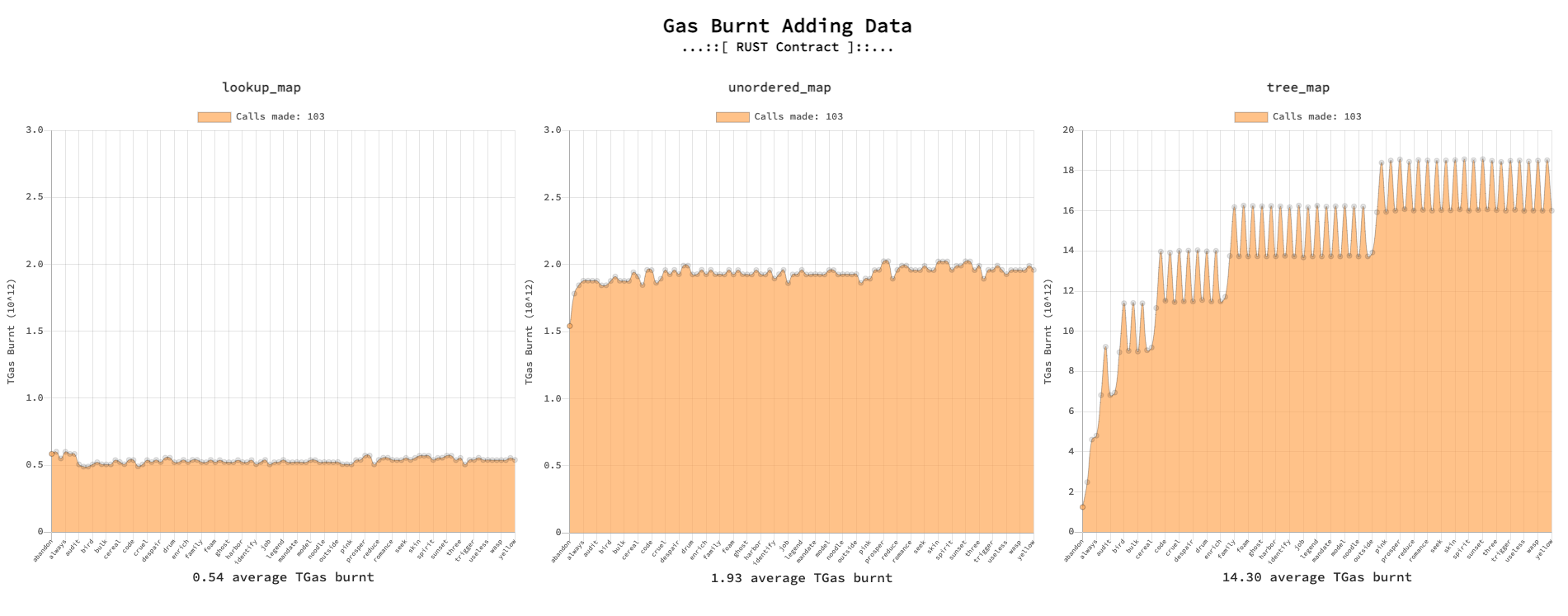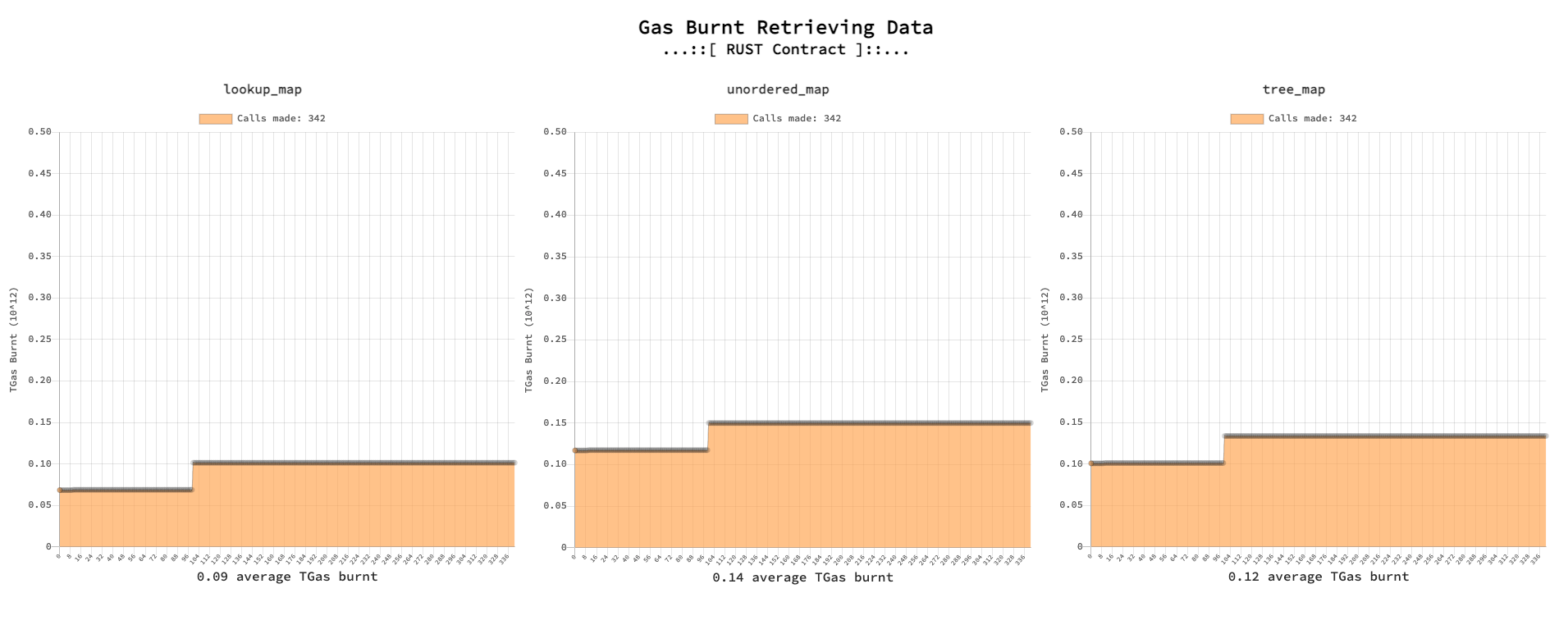Data Storage / Collections
All data stored on the NEAR blockchain is done in key / value pairs. There are several collection methods in the SDKs we've created that will help you store your data on chain.
near-sdk-rsfor Rust smart contractsnear-sdk-jsfor JavaScript smart contracts
For information on storage costs, please see [ storage staking ].
Rust Collection Types
near-sdk-rs module documentation
| Type | Iterable | Clear All Values | Preserves Insertion Order | Range Selection |
|---|---|---|---|---|
Vector | ✅ | ✅ | ✅ | ✅ |
LookupSet | ||||
UnorderedSet | ✅ | ✅ | ✅ | |
LookupMap | ||||
UnorderedMap | ✅ | ✅ | ✅ | |
TreeMap | ✅ | ✅ |
Big-O Notation
The Big-O notation values in the chart below describe the time complexity of the various collection methods found in
near-sdk-rs. These method complexities correlate with gas consumption on NEAR, helping you decide which collection to utilize in your project. There are three types found in our collection methods:
- O(1) - constant
- O(n) - linear
- O(log n) - logarithmic
| Type | Access | Insert | Delete | Search | Traverse | Clear |
|---|---|---|---|---|---|---|
Vector | O(1) | O(1)* | O(1)** | O(n) | O(n) | O(n) |
LookupSet | O(1) | O(1) | O(1) | O(1) | N/A | N/A |
UnorderedSet | O(1) | O(1) | O(1) | O(1) | O(n) | O(n) |
LookupMap | O(1) | O(1) | O(1) | O(1) | N/A | N/A |
UnorderedMap | O(1) | O(1) | O(1) | O(1) | O(n) | O(n) |
TreeMap | O(1) | O(log n) | O(log n) | O(log n) | O(n) | O(n) |
* - to insert at the end of the vector using push_back (or push_front for deque)
** - to delete from the end of the vector using pop (or pop_front for deque), or delete using swap_remove which swaps the element with the last element of the vector and then removes it.
Gas Consumption Examples
The examples below show differences in gas burnt storing and retrieving key/value pairs using the above methods. Please note that the gas cost of spinning up the runtime environment on chain has been deducted to show just data read/writes.
You can reproduce this and test out your own data set by visiting collection-examples-rs.


Vector
Implements a vector / persistent array.
- can iterate using index
- Uses the following map: index -> element.
[ SDK source ]
[ Implementation ]
LookupSet
Implements a persistent set without iterators.
- can not iterate over keys
- more efficient in reads / writes
[ SDK source ]
[ Implementation ]
UnorderedSet
Implements a persistent set with iterators for keys, values, and entries.
[ SDK source ]
LookupMap
Implements a persistent map.
- can not iterate over keys
- does not preserve order when removing and adding values
- efficient in number of reads and writes
- To add data:
pub fn add_lookup_map(&mut self, key: String, value: String) {
self.lookup_map.insert(&key, &value);
}
- To get data:
pub fn get_lookup_map(&self, key: String) -> String {
match self.lookup_map.get(&key) {
Some(value) => {
let log_message = format!("Value from LookupMap is {:?}", value.clone());
env::log(log_message.as_bytes());
value
},
None => "not found".to_string()
}
}
[ SDK source ]
[ Implementation ]
UnorderedMap
Implements an unordered map.
- iterable
- does not preserve order when removing and adding values
- is able to clear all values
- To add data:
pub fn add_unordered_map(&mut self, key: String, value: String) {
self.unordered_map.insert(&key, &value);
}
- To get data:
pub fn get_unordered_map(&self, key: String) -> String {
match self.unordered_map.get(&key) {
Some(value) => {
let log_message = format!("Value from UnorderedMap is {:?}", value.clone());
env::log(log_message.as_bytes());
value
},
// None => "Didn't find that key.".to_string()
None => "not found".to_string()
}
}
[ SDK source ]
[ Implementation ]
TreeMap
Implements a Tree Map based on AVL-tree.
- iterable
- preserves order
- able to clear all values
- self balancing
- To add data:
pub fn add_tree_map(&mut self, key: String, value: String) {
self.tree_map.insert(&key, &value);
}
- To get data:
pub fn get_tree_map(&self, key: String) -> String {
match self.tree_map.get(&key) {
Some(value) => {
let log_message = format!("Value from TreeMap is {:?}", value.clone());
env::log(log_message.as_bytes());
// Since we found it, return it (note implicit return)
value
},
// did not find the entry
// note: curly brackets after arrow are optional in simple cases, like other languages
None => "not found".to_string()
}
}
[ SDK source ]
[ Implementation ]
Storage Constraints on NEAR
For storing data on-chain it’s important to keep in mind the following:
- Can add up in storage staking costs
- There is a 4mb limit on how much you can upload at once
Let’s say for example, someone wants to put an NFT purely on-chain (rather than IPFS or some other decentralized storage solution) you’ll have almost an unlimited amount of storage but will have to pay 1 $NEAR per 100kb of storage used (see Storage Staking).
Users will be limited to 4MB per contract call upload due to MAX_GAS constraints. The maximum amount of gas one can attach to a given functionCall is 300TGas.

